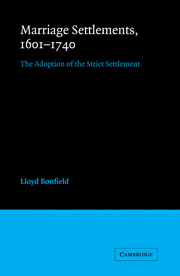Book contents
- Frontmatter
- Contents
- List of tables
- Preface
- List of abbreviations
- Introduction
- 1 The medieval inheritance and the Statute of Uses
- 2 Law in transition: the conflict over restraints upon alienation
- 3 Patterns of marriage settlement 1601–1659: the development of the ‘life estate-entail’ mode
- 4 The emergence of the strict settlement
- 5 The adoption of the strict settlement 1660–1740: Kent and Northamptonshire
- 6 Marriage settlements in perspective: the social and economic aspects
- Conclusion
- Bibliography
- Index
- CAMBRIDGE STUDIES IN ENGLISH LEGAL HISTORY
Introduction
Published online by Cambridge University Press: 07 October 2011
- Frontmatter
- Contents
- List of tables
- Preface
- List of abbreviations
- Introduction
- 1 The medieval inheritance and the Statute of Uses
- 2 Law in transition: the conflict over restraints upon alienation
- 3 Patterns of marriage settlement 1601–1659: the development of the ‘life estate-entail’ mode
- 4 The emergence of the strict settlement
- 5 The adoption of the strict settlement 1660–1740: Kent and Northamptonshire
- 6 Marriage settlements in perspective: the social and economic aspects
- Conclusion
- Bibliography
- Index
- CAMBRIDGE STUDIES IN ENGLISH LEGAL HISTORY
Summary
For the desire of great landowners has constantly been to make the strictest settlements which the law would allow, and the law … has set bounds, though liberal ones, to the power of fettering inheritances and suspending absolute ownership. And the ingenuity of conveyancers, devising how to satisfy private ambition within the field left clear to it by public ordinance, has produced that curious and exquisite structure [the strict settlement] which, a hundred years hence, will probably be abandoned to the care of a few legal antiquaries as the learning of disseisin and collateral warranty.
Sir Frederick Pollock, The Land Laws, 2nd edn (London, 1887), 114–15In the mid-seventeenth century, conveyancers developed a form of property settlement which was rapidly adopted by most segments of English landed society. With minor modifications this conveyancing precedent, the strict family settlement executed upon the marriage of the eldest son, remained the prevailing means by which landed wealth was transmitted between the generations until the twentieth century when a changing economic and political climate rendered moribund the social structure which the settlement sought to preserve. For more than two centuries, however, much of the land in England was held under strict settlement. Particularly in pre-industrial England, where so vast a proportion of the nation's capital and human resources was invested in land and agricultural production, the restraints which the strict settlement placed upon the freedom of the tenant in possession to alienate, consolidate, or exploit his estate must have had a profound effect upon the economy.
- Type
- Chapter
- Information
- Marriage Settlements, 1601–1740The Adoption of the Strict Settlement, pp. xiii - xviiiPublisher: Cambridge University PressPrint publication year: 1983

